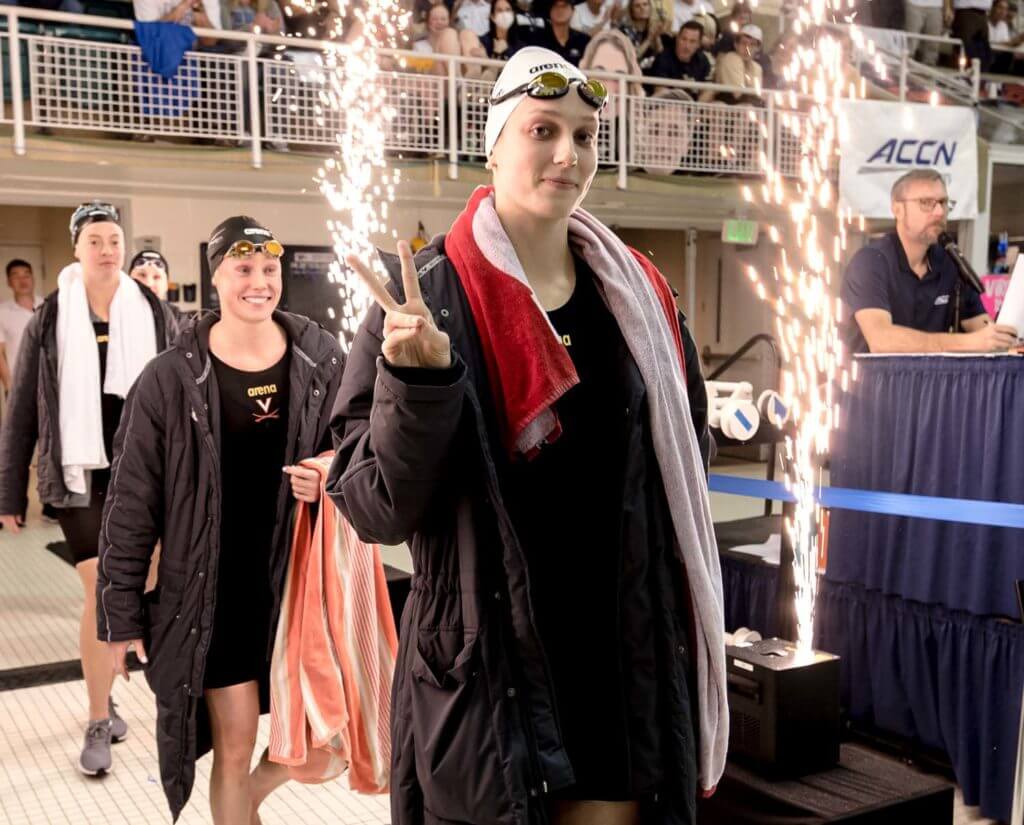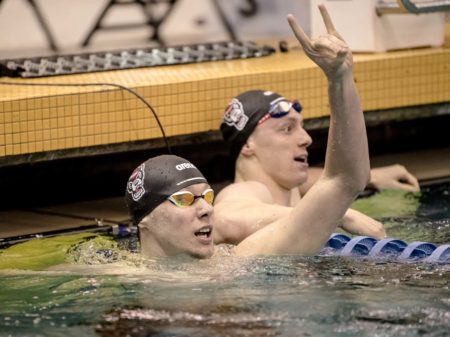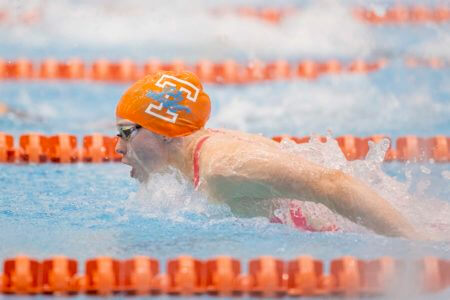NCAA Swimming Notebook: Virginia Women Better Than 2021 Championship Squad

NCAA Swimming Notebook: Virginia Women Better Than 2021 Championship Squad
In 2021, the University of Virginia women’s team won the NCAA title by 137 points over the closest competitor, securing the national crown that most assumed the Cavaliers would win in 2020 before the cancellation of the NCAA Championships. Paige Madden was the top swimmer of the meet, while sophomore Kate Douglass won the 50 free and finished second in two other events and Alex Walsh won the 200 IM.
This year, Madden has graduated, and the competition on the national level will be more formidable, but this Virginia team looks so much more complete. Through nine out of 18 swimming events at the ACC Championships, Virginia is undefeated. That includes three relays, two of them in American and NCAA-record time, and a pair of individual 1-2 finishes.
We know about Douglass’ incredible versatility: she was top-two in three sprint events at NCAAs last year, she is the Olympic bronze medalist in the 200-meter IM, and just two weeks ago, she became the second-fastest swimmer ever in the 200 breaststroke. But if she is the most versatile swimmer in the country, Walsh is a very close second.
Aside from her individual national title last year, Walsh finished fifth in her other two individual events, the 200 free and 200 breast, but she swam the nation’s fastest times earlier this season in the 400 IM and 200 fly. Thursday night at the ACC meet, Walsh won the 200 free in a time of 1:42.28, almost two seconds quicker than her fifth-place time from NCAAs last year and faster than Madden swam in winning the national title in the race. So she is clearly a three-event contender this year.
Junior Ella Nelson is an under-the-radar star after finishing second at last season’s NCAAs in the 400 IM and 200 breast, while Emma Weyant already has a 500 free victory and 400 IM second-place finish (to Nelson) at the conference meet. And perhaps most significantly, Virginia’s major roster addition, Gretchen Walsh, has surpassed all hype surrounding her as a star sprinter coming out of Nashville.
Gretchen, Alex’s younger sister, has been a rising force in the 50 and 100 freestyle events for years, but this season, she has rapidly developed into a monster backstroke force. Her 50 back leadoff split on Friday’s 200 medley relay was 22.82, the first-ever split under 23 seconds by a female. On Friday, she will face off with reigning NCAA champion Katharine Berkoff in the 100 back, and the feeling is that she is capable of a really special performance, almost surely below the 50-second barrier.
And finally, it is basically impossible to imagine any other team challenging the record times posted by Virginia in the 200-yard relays. Records will be on watch in the 400 medley and freestyle relays still to come, and the Cavaliers will have Douglass and both Walsh sisters available for both (since all three have already sat out one relay each).
Maybe there is a team out there capable of challenging Virginia at the NCAA Championships. The obvious candidate is Stanford, a high-ceiling team led by Olympic medalists Regan Smith, Torri Huske, Taylor Ruck and Brooke Forde. Indeed, it will be interesting to watch for Stanford’s times at next week’s Pac-12 Championships to see how they match up to Virginia’s (in relay events, particularly in the 800 free).
But right now, Virginia has had about as strong a start to conference championship season as we have seen in the sport’s recent past.
NC State Men Are Back

NC State’s Luke Miller after winning the 200 free at the ACC Championships — Photo Courtesy: Kyle Hess/theACC.com
The North Carolina State men’s program elevated to national powerhouse status during the last decade under head coach Braden Holloway. In 2021, the Wolfpack women’s team actually surpassed the men by finishing second at the NCAA Championships, while the NC State men fell to a disappointing eighth place. This year, the NC State men have incredible depth that should make an impact at the national level, with a strong chance at a return to the top-five.
It was remarkable watching NC State finish 1-2-3-4 in the 500 free at the ACC Championships behind Ross Dant, James Plage, Will Gallant and Eric Knowles (and no one familiar with NC State distance coach Mark Bernardino will be surprised to see such success in the longer events). Thursday’s 200 free saw five NC State swimmers in the A-final, and it was little-known sophomore Luke Miller winning in 1:32.46, a fine split but not at the level of his sizzling 1:31.03 relay split from Tuesday’s 800 free relay.
Of course, the NC State program under Holloway has been best known for its sprinters, and the Wolfpack have a hyped-up freshman living up to expectations in David Curtiss. Speaking of which…
Two Freshman and an Olympian Setting the Standard in Sprint Freestyle
The SEC Champion in the men’s 50 free? Jordan Crooks, who improved his best time from 19.39 entering the week to 18.53, which merely made him the fifth-fastest performer in history behind a quartet of legendary performers (Caeleb Dressel, Ryan Hoffer, Cesar Cielo and Matt Targett). Meanwhile, a couple hours south in Atlanta, Curtiss won the ACC title in 18.74. NC State was actually disqualified for Curtiss’ -0.08 reaction time in Thursday’s 200 medley relay, and with that illegal and advantageous start, Curtiss split 18.08.
These are two teenagers swimming an event typically dominated by more physically developed swimmers. They will be among the favorites for the splash-and-dash at the NCAA Championships, both aiming to become the first freshman titlist in the event since Dressel in 2015.
Crooks and Curtiss currently rank first and second, respectively, in the national rankings in the 50 free, and splitting the difference is LSU junior Brooks Curry, a name surely familiar to swimming fans after he qualified for the U.S. Olympic team in the 400 free relay. Many surprising Olympic qualifiers go on to raise their game the following college season, and it is no surprise to see Curry following in that trend.
At the SEC meet, Curry swam an 18.67 in the 50 free, three tenths quicker than his best time all of last year, and his mark of 1:31.39 in the 200 free Thursday was his personal best time by more than a second. And he has his best event, the 100 free, still to come, and a mark in the 41-low range is certainly within his range.
Tennessee Women Surging at SEC Championships

Tennessee’s Ellen Walshe — Photo Courtesy: Andrew Ferguson/Tennessee Athletics
Entering conference season, it was clear that the Southeastern Conference possessed multiple women’s squads capable of strong top-10 finishes at the NCAA Championships, but stacking those teams up against each other proved slightly confounding. Well, this week, Tennessee has been by far the dominant squad at the SEC Championships.
The Volunteers already have four individual SEC titles, all of them by freshman. On Wednesday, Julia Mrozinski won the 500 free before Ellen Walshe took first in the 200 IM. Then, Walshe attempted an ambitious double Thursday evening and performed wonderfully, winning the 400 IM and 100 fly in quick succession.
In a conversation two weeks ago, Walshe hinted she may attempt both events, but seeing her pull off a 4:01.53 400 IM and a 50.34 100 fly with just one men’s race in between was incredibly impressive. Of course, trying that double again on the national level would be even tougher with no men’s events to serve as a cushion, leaving Walshe and the Tennessee coaches with a tough decision to make.
Friday’s action will see the other half of Tennessee’s Irish duo in the pool as Mona McSharry stars in the 100 breaststroke, and the 400 medley relay sets up really strong with a likely team of Josephine Fuller, McSharry, Walshe and Tjasa Pintar. Expect to see the weekend finish with the Vols having captured a conference crown while significantly boosting their profile leading into the final month of the season.
What’s the Ceiling for Georgia Men?
The dominant men’s team at the SEC Championships has been Florida, even without Olympic gold medalist Bobby Finke available this week. Meanwhile, the battle for second place has been super tight, with Georgia, Tennessee and Alabama all within 15 points heading into Friday and Texas A&M not far behind. Out of that group, the team most likely to carry its success to the national level is Georgia.
The knock on the Bulldogs is that they lack the sprint depth that teams can ride to big points at championship meets. Dillon Downing (fourth) was Georgia’s only A or B-finalist at the SEC Championships in the 50 free. But head coach Jack Bauerle’s group does have three studs that can lead their team at the conference championships and then score big on the national level.
There is Jake Magahey, the reigning national champion in the 500 free. Another sophomore, Luca Urlando, posted a strong 1:41 in the 200 IM Wednesday and 44.4 in the 100 fly Thursday, with his signature 200 fly still to come. And then Matt Sates, the South African set multiple world junior records in short course meters in the fall before arriving on the college scene in recent weeks. So far at the SEC Championships, Sates has swum the nation’s fastest time in the 500 free (4:09.06 while negative splitting the race by more than two seconds) and the second-best mark in the 200 free (1:31.16).
In previous seasons, Georgia’s men have finished higher than expected at the NCAA Championships, and while repeating last season’s fourth-place finish might be tough, just getting big points out of this trio will go a long way toward propelling the Bulldogs in March.




.png)